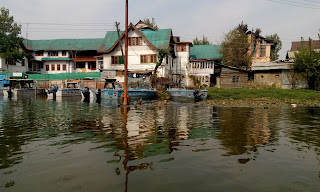After the Kashmir jaunt, there was another itinerary on my list and I was not going to miss it - Dharamshala in Himachal Pradesh, and not too far from Amritsar. The abode of the Most Holy Dalai Lama!
So one Saturday when I was off work I proceeded to the Amristar Inter State Bus terminal. I had enquired earlier, and the bearded Sikh had informed me that there was just one direct bus to Dharamshala from Amritsar and it was a Himachal State Transport bus that departed daily evening.
I noted that the Amritsar Inter State Bus stop was sanitised like the bus stands in my home state, a far cry away from dirty, infested bus terminals of North India usually packed with beggars. The Golden Temple effect I guessed. I recoiled at the memory of the dirty, heavily congested bus stops that I had experienced till then, especially the one at Jammu.
While on the bus I noticed there were two foreign couple seated some seats behind me, en route to the same destination.
One was a young man - woman hippy couple. The brunette was short and slightly built, with very curly dark hair spoke fluent English, though she she seemed more European than American or British, while her bespectacled companion kept mostly to himself; and the other was a pair of well built, sun tanned young men who looked Spanish, but seemed to have travelled from Australia. They were travelling all over the world picking up temporary janitorial jobs as they moved, to handle their daily expenses, I came to know from their idle banter.
One of the hippy men asked the brunette if the companion was her husband, but the woman replied matter of fact that they were not, but that is what they posing as to avoid being lynched by the "moral police", she added with a laugh!
Their talked moved to their experience in India, and the brunette remarked that India was so many countries rolled into one - with deserts, beaches, snow capped mountain peaks, forests, dense cities, backwaters, palaces and temples. To me that seemed to make sense and I agreed how true that was!
When we reached Dharamshala a good eight hours or so later, it was pretty dark. I came to learn that Dharamshala was actually a commercial centre while the Dalai Lama and his Tibetan followers actually resided a couple of kilometres on the upper reaches of Dharamshala near the foothills of the Himalayas, a hill station with the anglicised name of MacLeodGanj.
Since it was pretty late, I decided to put up at a hotel and leave the sight seeing for the next day. From Dharamshala I took a cab and asked the driver to take me to a not too expensive hotel. After a twenty minute ride we pulled up in front of a modern building that was built on a cliff overlooking the valley below. Two young locals arranged a single room for me from where I had a breathtaking view the twinkling lights of MacLeodGanj, the deep valley below and a snow covered peak rising above it.
I was feeling cold and got one of the young chaps to get me a bottle of gin from nearby bar. I got a little drunk and then faced a unique problem. I was smoking heavily and to keep the air moving and prevent being suffocated with the cigarette smoke, I had opened the ventilators above the windows, and when that didn't make it any better, put on the overhead fan as well.
The temperature outside was sub-zero and after a wash in the lukewarm tap water in the bath, I was literally freezing. Having heard of hypothermia and frost bite, I was not willing to take any chances. I put on two shirts and my jacket over it and slept with my socks and pants on. That make me warmer and I dozed off. A sight for sore eyes!
The next day I walked from the hotel up a steep incline towards MacLeodGanj town, which was literally nothing much but a few shanty buildings on either side of the road, with old wizened Tibetan women sitting outside, knitting woollen sweaters and socks, the men selling Buddhist mementos in improvised stalls. I noted one particular seedy building with a sign outside "Massage Parlour". Aware of the real purpose of massage parlours in Nepal and Thailand, I was a bit intrigued by the sign but didn't allow my curiosity to get the better of me and I moved on.
As it was already lunch time I decided to have lunch at a Tibetan eatery a ordered some soup and an unpronounceable dish whose name I didn't grasp. It was nothing to write home about except that it was heavily laced with herbs and spices with floating boiled chicken morsels that reminded me more of medical tonic than food. Guessed it kept the Tibetan warm in the cold weather.
Since I had nothing much to do I decided to walk up the few kilometres up a steep incline towards what was Upper Dharamshala. I enjoyed the crisp cool fresh air as I walked up and decided to have a quick omelette and noodles at a small wayside eatery intriguingly called "By Mistake". Well, it was "by mistake" that I had come across it in the first place! I noticed the same foreign couple who I had met in the bus walking up the mountain track behind me and the young woman who seemed to recognise me, smiled and yelled a "Hallo". I waved back.
It was there I met a young fellow traveller who accompanied me all the way up the the way up to upper Dharamshala. I welcomed his company and we started chatting about nothing in particular. It seemed he was originally from Himachal Pradesh but worked as a dairy engineer in Maharashtra, and every once in a year returned to Dharamshala and MacLeodGanj to have a walk up this very same mountain path,
As we made our way up, he relented to my request of couple of snaps of me against the breathtaking background of pine trees and the valley below. At one point we came across an old Buddhist monk with a walking stick trudging the way down. The old monk was taken aback when I asked him if I could take a snap of him with me. Nevertheless he nodded, and my friend took snaps and I reciprocated in kind. The monk understood English and we said our Thank You's before moving on.
As we made our way to the end of the trail, I noticed a couple of brand new cars parked on either side along the way, in the middle of nowhere and gathering dust. Seemed like some people had decided to visit but then decided to stay on, taken away by the rustic charm of MacLeodGanj!
At the summit we had our reward of hot piping tea and my companion decided to part ways with me as he had made up his mind to climb the forbidding hill that lay ahead with no visible way up. He pointed to a small temple at the top with a fluttering saffron flag atop. My friend said he was going to climb up all the way and take blessings of the gods. He was already breathing heavily but he had made up his mind to climb all the way up.
When I returned to MacLeodGanj, I did the usual tourist thing and visited the Dalai Lama's Buddhist monastery, the de facto capital of the Tibetan government in exile.
Prayer time was over and I entered the heavily guarded monastery teeming with Tibetan monks after a careful body check by Tibetan security. Nothing much to remark except I noticed that the sanctum sanctorum had piles and piles of Swiss chocolates and sweets neatly arranged into small mountains untouched by man or animal. Enough for the monks to survive a siege for months in case there was one! The chocolates were gifts by foreign well wishers and some even had unmoved tags saying "Gift from Germany by ..." etc. The Tibetan cause seemed to be popular across the world, cutting across nationalities.
On my way back to Dharamshala by bus to Amritsar via Pathankot, I was caught by the irony of Kashmir and MacLeodGanj, just a few hundred kilometres from each other - one, where a people complained of being subjugated by their government, and the other where refugees subjugated by their own government, had decided to call home!









